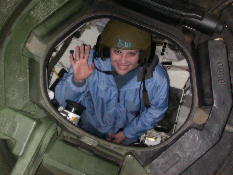February 26, 2008
Sitting on a bunk in Bravo Company's outpost, Staff Sgt. Corey Hollister noted the irony that, even as the debate in America remained bizarrely unaffected by the reality around him, "It's really military personnel and their families who don't want [the Army] to leave Iraq."
My husband is frustrated that he could've spent six months learning Farsi only to deploy to Iraq (where no one speaks Farsi). He would've rather learned Arabic then. He wants to be able to communicate with the people, wants to read as many books as he can about Sunnis and Shiites and Arab culture, wants to get another chance to participate in this war. Not for the killing but for the cultural cross-pollination.
And indeed, there's cross-pollination:
Officers in the Grand Army of the Tigris, as one of its senior officers calls the American force, dine with local elders at "goat grabs," greet them with "man-kisses," and routinely punctuate their own conversations with the casual "insha'allah." The vernacular has even followed the Army home: In the halls of the Pentagon, where nearly every Army officer has served at least two tours in Iraq, officers ask whether this or that official has "wasta"—Iraqi shorthand for "influence" or "pull," though with a slightly more corrupt tinge.
It's the military families that don't want to leave Iraq because they are the ones who've become invested. They're the ones who are getting steeped in this culture and looking for ways to make it compatible with ours. And they're the ones who understand the little picture as well as the big one.
My husband has always said that Iraq has way more than a problem between Sunnis and Shiites, because even in all-Shiite villages, there are still feuds. Between this group and that, this clan and that, this cousin's branch and that, this side of the street and that. Put two Iraqis in a room together, and they'll find something to divide them. So I got a kick out of this:
This much was evident at a gathering of 20 local elders, where a young captain named Palmer Phillips cajoled and corralled sheiks three times his age. "Hey," Phillips admonished the feuding tribal leaders, "There can't be anymore of this Dulaimi versus Assawi action going on."
The soldiers on the ground are working with the nuances and getting physically and emotionally invested in the outcome. Really, really invested. And they don't want to fail. But most of all they don't want to be sent home before they have a chance to succeed.
Read the whole article.
UPDATE:
Also read Gordon Alanko's Reconstructing Relationships. "Juggling kittens" indeed.
Posted by: Sarah at
05:49 AM
| Comments (5)
| Add Comment
Post contains 439 words, total size 3 kb.
Posted by: tim at February 26, 2008 07:13 AM (nno0f)
Posted by: Ann M. at February 26, 2008 12:00 PM (HFUBt)
Posted by: david foster at February 26, 2008 01:21 PM (ke+yX)
Posted by: none at February 27, 2008 06:03 AM (X8iAz)
Posted by: Stephanie at February 28, 2008 10:29 AM (F741V)
49 queries taking 0.0913 seconds, 202 records returned.
Powered by Minx 1.1.6c-pink.














